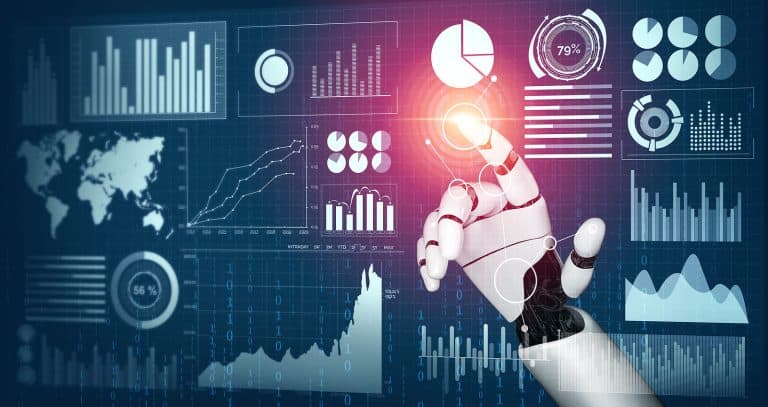In the years before the internet exploded first into our homes, and then into our pockets, marketing was a very different beast than what it is today. Print advertising, traditional media direct mail and good old word-of-mouth amongst real (i.e. not “Facebook”) friends and family were pretty much the only options marketers had for spreading the word about their company and its products.
Table of Contents
ToggleToday, of course, it’s a much different story. Digital now reigns supreme. In fact, according to recent research by Winterberry Group, in 2018, digital media spending ($100.8 billion) was projected to surpass offline media and marketing spending ($97.8 billion) for the first time.

(Image source: winterberrygroup.com)
It’s no secret that the pace of technological change is relentless. However, while some organizations are still only now getting to grips with inbound, content, and social media marketing, today’s most forward-thinking marketers are already experimenting with emerging technologies such as artificial intelligence (AI), machine learning and automation, – and of course, the enormous shift to digital puts the emphasis firmly on data.
Given all this change, what does the future hold? What will CMOs need to be focusing on over the coming years, and how will the role of marketer evolve?
It’s Your Data, Stupid!
But, of course you’re not stupid. Most CMOs recognize the huge potential of big data to target new customers and optimize the experience and user journey of existing ones. However, many remain decidedly overwhelmed by the sheer volume, variety and disorder of the unstructured data they have to manage.
A big part of the problem is that it’s not enough to just simply gather the data – you need to be able to connect it, analyze it, and draw insights from it. In an interview with Forbes, former CEO of the Data & Marketing Association Tom Benton describes the impact data is having on marketing teams. “The sheer amount of data from a near-infinite combination of media, devices, platforms and channels allows marketers the opportunity to deliver 1-to-1 customer experiences at a massive scale. If these are leveraged adeptly, a business with a million customers can deliver an experience just as tailored as a business with a dozen customers. But that also means today’s marketers have a range of questions to ask themselves: What is the right technology to work with to meet our business goals? What untapped data sources should we be exploring? Are all of our datasets coming together to inform each other, or are they siloed into different departments and databases?”
Benton indeed touches on a key point here. For a long time, marketing departments have had their data separated in silos – email data, social media data, website data, purchase histories, browsing histories, display ads, content downloads, etc., etc., etc. All have been managed by separate point solutions. But we’re living in an omnichannel world now, and marketing teams need to be able to create data-driven omnichannel experiences that motivate customers in the channel that is most comfortable and appropriate for them.
To do so, of course, will require investment in advanced data integration and marketing automation solutions – powered by AI. As such, the role of the marketer will evolve from its traditional roots of being communications- and campaign-focused, to one of being user experience-, technology-, and most importantly data-focused over the coming years.
The Impact of AI on Digital Advertising
As Benton put it in his interview with Forbes: “The exponential growth of the programmatic media industry during the past 10 years is a perfect example of how data is the currency that is underwriting 21st century marketing. No longer satisfied with one-dimensional reach and frequency scores, or hang-time on websites, marketers are looking for real, measureable performance from their investments. Data-inspired marketers are using data to make real-time decisions on marketing and media allocations that just couldn’t have been possible in the past.”
Traditionally, humans have been the key decision-makers behind the ad buying process – managing bid rates, allocating budgets, negotiating prices with other humans, etc. But with programmatic ad buying, all of this is completed automatically with AI – and it has many, many advantages.
Precision targeting, of course, is one of the most crucial and valuable. AI technologies enable advertisers to understand customer data at a micro level, and establish with a greater degree of accuracy than a human being would be ever be able to accomplish whether an individual would be interested in purchasing a brand’s products. Sophisticated algorithms analyze a user’s online behavior – browsing history, purchase history, purchase affinity – and combine it with personal details such as net worth, location data and demographic data.
These remarkably accurate customer profiles are then combined with automated real-time bidding in virtual ad space auctions, enabling advertisers to serve highly-tailored ads to the right individuals in the right place at the right time – and it all takes place in the blink of an eye.

(Image source: blog.revcontent.com)
But what does this mean for the role of the marketer? Well, naturally, there is some speculation that as programmatic grows in prominence, there will be job losses. However, the other side of the argument is that while we’ve got AI taking care of gathering and analyzing customer data and optimizing ad spend, digital ad buyers and marketers are free to focus on the creative side of advertising to fuel campaign success. Even so – and once again – data analytics skills will be required somewhere within the department (even if it’s outsourced), meaning that CMOs will have to consider how they source staff with the necessary skillsets. In addition, real human beings will still be required to plan, control and optimize any programmatic strategy an organization has – but skills in programmatic are most definitely something that those human beings are going to have to develop.
Will Content Still Be King?
Yes, and no. No, because it’s your data, stupid! But yes, because data will be increasingly used to inform creative content strategies.
More and more, content marketing success will depend on an organization’s ability to identify and draw meaningful insights from relevant data that illuminates precisely how users are engaging with content, and then use those insights to inform content strategy and decision making. The opportunity to build relationships with customers and bring them closer and closer to making a purchase grows with each and every interaction those customers have with an organization’s content. Optimizing that content for maximum impact is thereby essential – and data holds the key to unlocking crucial signals and delivering personalized experiences that convert.
Data integration will once again be vital, as will leveraging predictive analytics, machine learning and automation technologies to apply data insights to content marketing strategy. Only by becoming data driven will marketing teams be able to learn from customer behavior insights and patterns, and then contextually present the most effective messages and content to the right customers on the right channels to suit each of their unique communication preferences.
Final Thoughts
Data is the future of marketing. The marketing teams of tomorrow will need to leverage analytics and automation tools to take more decisive ownership of end-to-end customer journeys and connect data, insights and experiences. Far from being simply brand builders, marketers will become increasingly responsible for acquiring customers, engaging those customers, and increasing the lifetime value of each and every one of them – and data will be at right at the heart of it all.
The last word goes to Tom Benton: “Data hasn’t just changed the CMO Role. It has disrupted it. CMOs were traditionally communications and campaign-focused. Now, there are many more aspects to it. Today’s data-inspired CMOs must not only be marketing communications experts, they must also be user experience experts. They have to understand ecommerce. They have to understand the totality of the holistic customer journey.”
Role of a Marketer
CMOs recognize the huge potential of big data to target new customers and optimize the experience and user journey of existing ones. However, many remain decidedly overwhelmed by the sheer volume, variety and disorder of the unstructured data they have to manage. A big part of the problem is that it’s not enough to just simply gather the data – you need to be able to connect it, analyze it, and draw insights from it. For a long time, marketing departments have had their data separated in silos – email data, social media data, website data, purchase histories, browsing histories, display ads, content downloads, etc., etc., etc. All have been managed by separate point solutions. But we’re living in an omnichannel world now, and marketing teams need to be able to create data-driven omnichannel experiences that motivate customers in the channel that is most comfortable and appropriate for them. To do so, of course, will require investment in advanced data integration and marketing automation solutions – powered by AI. As such, the role of the marketer will evolve from its traditional roots of being communications- and campaign-focused, to one of being user experience-, technology-, and most importantly data-focused over the coming years.





